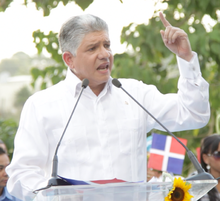Eduardo Estrella
| Eduardo Estrella | |
|---|---|

Eduardo Estrella Virella
|
|
| President of the Partido Dominicanos por el Cambio | |
|
Assumed office January 10, 2010 |
|
| Senate of the Dominican Republic from Santiago de los Caballeros | |
|
In office August 16, 1994 – August 16, 1998 |
|
| Succeeded by | José Rafael Abinader |
| Secretary of Public Works and Communications | |
|
In office 1991–1994 |
|
| President | Joaquín Balaguer |
| Executive Director of the National Institute of Water and Sewage | |
|
In office 1990–1991 |
|
| President | Joaquín Balaguer |
| Under Secretary of State for Public Works and Communications | |
|
In office 1986–1990 |
|
| President | Joaquín Balaguer |
| Secretary of Second Class in the Dominican Embassy in Mexico | |
|
In office 1972–1975 |
|
| Personal details | |
| Born |
5 June 1953 Santo Domingo, Dominican Republic |
| Nationality | Dominican |
| Political party | Dominicanos por el Cambio |
| Spouse(s) | Arelis Cruz de Estrella |
| Children | Paula, Mabel and Eduardo Guarionex |
| Residence | Santiago de los Caballeros, Dominican Republic |
| Alma mater | Universidad Nacional Autónoma de México UNAM |
| Occupation | Politician, Entrepreneur, Civil Engineer |
| Religion | Roman Catholicism |
| Website | www |
Rafael Eduardo Estrella Virella (born June 5, 1953) is a civil engineer, entrepreneur and Dominican politician. He served as Secretary of State for Public Works and Communications of the Dominican Republic during the second term 1991–94, of President Joaquín Balaguer and also he served as Senator for the province of Santiago de los Caballeros during the period 1994–98.
Estrella is one of the few Dominican politicians recognized and highly valued for his honesty and cleanliness during the years he was in the public exercise, and out of these. He was the first presidential candidate of the Social Christian Reformist Party after the death of its leader, Dr. Joaquín Balaguer, after being elected in March 2003 as a presidential candidate of that organization. In 2007 he resigned from that organization to build a new party, since Social Christian Reformist Party was attached to the current government of Dominican Liberation Party and what he firmly opposed during the years, thus forming the Dominicans for Change Party, which currently is the president.
Rafael Eduardo Estrella Virella was born on June 5, 1953, the son of Mayor General Guarionex Estrella and Mabel Elisa Virella de Estrella and grandson of General Pedro Antonio Estrella (Piro). Her siblings are Paula, Mabel, Guarionex and Rosa Margarita. He married to Arelis Cruz Estrella and they have three children: Paula Isabel, Eduardo Guarionex and Elisa Mabel. He is also the nephew of the national hero Salvador Estrella Sadhalá. He is married to Arelis Cruz de Estrella and they have three children. In 1961, when Estrella was 8 years old, his father was arrested and tortured under suspicion of complicity in the assassination of dictator Rafael Trujillo. Estrella describes this as the formative event of his youth.
Eduardo Estrella is from the second largest city in the Dominican Republic, Santiago, known as a breeding ground for politicians. He comes from a prominent family that protected opponents of Rafael Trujillo's 1930-61 dictatorship. His father and grandfather were senior military officers, and an uncle was among the conspirators who assassinated Trujillo a group now revered as national heroes.
Eduardo Estrella began his primary education at the Colegio Calasanz de Santo Domingo, continuing at the Colegio de la Salle in the city of Santiago de los Caballeros, which also took place in high school. His university studies were conducted at the Universidad Autónoma de México (UNAM), the United States of Mexico. Estrella graduated from the Autonomous University of Mexico UNAM) with a civil engineering degree, and PRSC President Balaguer appointed him second secretary at the Dominican Embassy in Mexico City. Estrella returned to the Santiago area and served as president of the Northern Regional Dominican School of Engineers, Architects and Surveyors. Elected as Santiago's senator in 1986, he was appointed by Balaguer as Under Secretary for Public Works and Communications and in 1991 advanced to Secretary of State for Public Works and Communications, a post he held until 1994. Estrella returned to his elected position in the Senate from 1994-1998.
...
Wikipedia
